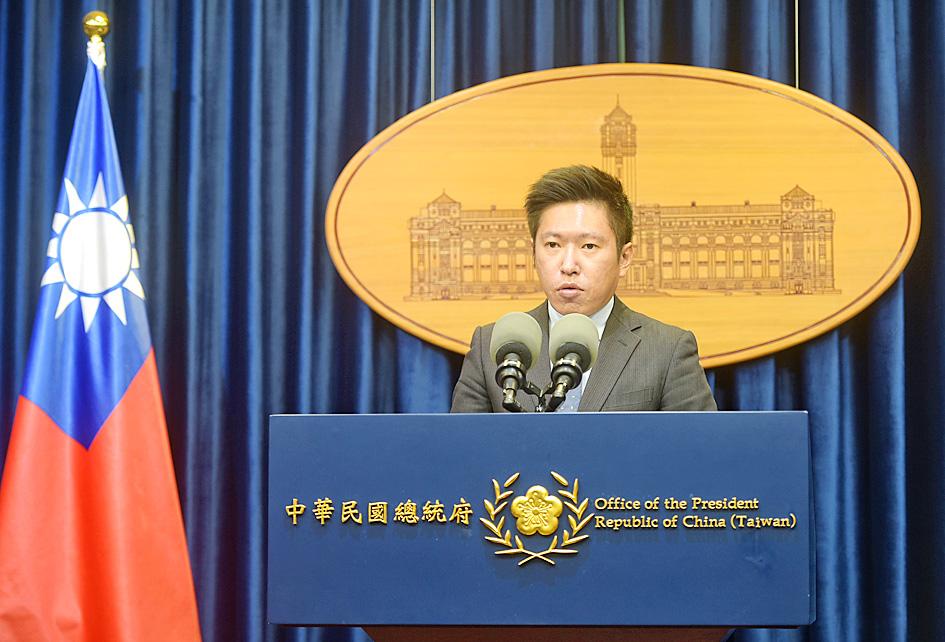President Tsai Ing-wen (蔡英文) yesterday instructed the government to bolster self-defense capabilities, improve relations with the US across party lines, and stabilize economic and social order.
The directives were issued at a National Security Council meeting, which was held earlier yesterday amid an increasing number of incursions by Chinese military planes and ahead of Tuesday’s US presidential election.
In anticipation of the Chinese Communist Party’s fifth plenum this week and the US presidential election, Tsai last month had also instructed the council to form a task force to increase intelligence gathering on possible scenarios, Presidential Office spokesman Xavier Chang (張惇涵) told a news conference in Taipei yesterday afternoon.

Photo: Chang Chia-ming, Taipei Times
During the meeting, Tsai said the nation should further modernize its defense capabilities, upgrade its asymmetric combat capabilities, promote indigenous arms development and reform its reserve forces to brace for Beijing’s military expansion and aggression, Chang quoted Tsai as saying.
Taiwan has garnered support from the majority of people and bipartisan politicians in the US, Tsai said, adding that the progress of Taiwan-US relations is obvious to Taiwanese.
She also instructed the council, the Ministry of Foreign Affairs and the Taipei Economic and Cultural Representative Office in the US to work to maintain the support of the Democratic Party as well as the Republican Party.
Tsai also asked government agencies to follow Premier Su Tseng-chang’s (蘇貞昌) instructions to improve cooperation with suppliers in key industries, make the Taiwan-US Economic and Commercial Dialogue happen, start talks over a bilateral trade agreement and resume negotiations with the US regarding the Trade and Investment Framework Agreement (TIFA).
Taiwan-US meetings about the TIFA have been suspended since 2017.
The Cabinet should take advantage of the Taiwan-US framework for strengthening basic infrastructure financing and market-building cooperation signed in September to promote supply chain cooperation in New Southbound Policy countries as well as Central and South American countries, Tsai was quoted by Chang as saying at the council meeting.
She also asked economic and financial agencies to closely monitor global economic changes after the US election, boost relief aid to industries hit hard by COVID-19 and implement major investment and infrastructure development projects.
Tsai said that stabilizing cross-strait relations is a shared interest of the two sides of the Taiwan Strait.
The two sides should discuss how to peacefully coexist based on mutual respect and understanding, she said, adding that Taiwan is willing to foster a meaningful conversation based on parity and dignity.
Hopefully, Beijing will help make such a conversation happen soon, she said.
Tsai also asked the Coast Guard Administration and police agencies to maintain social order, prevent the spread of misinformation and improve infrastructure security protection to safeguard the nation’s democracy and freedom.

MAKING WAVES: China’s maritime militia could become a nontraditional threat in war, clogging up shipping lanes to prevent US or Japanese intervention, a report said About 1,900 Chinese ships flying flags of convenience and fishing vessels that participated in China’s military exercises around Taiwan last month and in January have been listed for monitoring, Coast Guard Administration (CGA) Deputy Director-General Hsieh Ching-chin (謝慶欽) said yesterday. Following amendments to the Commercial Port Act (商港法) and the Law of Ships (船舶法) last month, the CGA can designate possible berthing areas or deny ports of call for vessels suspected of loitering around areas where undersea cables can be accessed, Oceans Affairs Council Minister Kuan Bi-ling (管碧玲) said. The list of suspected ships, originally 300, had risen to about 1,900 as

Japan’s strategic alliance with the US would collapse if Tokyo were to turn away from a conflict in Taiwan, Japanese Prime Minister Sanae Takaichi said yesterday, but distanced herself from previous comments that suggested a possible military response in such an event. Takaichi expressed her latest views on a nationally broadcast TV program late on Monday, where an opposition party leader criticized her for igniting tensions with China with the earlier remarks. Ties between Japan and China have sunk to the worst level in years after Takaichi said in November that a hypothetical Chinese attack on Taiwan could bring about a Japanese

MORE RESPONSIBILITY: Draftees would be expected to fight alongside professional soldiers, likely requiring the transformation of some training brigades into combat units The armed forces are to start incorporating new conscripts into combined arms brigades this year to enhance combat readiness, the Executive Yuan’s latest policy report said. The new policy would affect Taiwanese men entering the military for their compulsory service, which was extended to one year under reforms by then-president Tsai Ing-wen (蔡英文) in 2022. The conscripts would be trained to operate machine guns, uncrewed aerial vehicles, anti-tank guided missile launchers and Stinger air defense systems, the report said, adding that the basic training would be lengthened to eight weeks. After basic training, conscripts would be sorted into infantry battalions that would take

DEEP-STRIKE CAPABILITY: The scenario simulated a PLA drill that turned into an assault on Taiwan’s critical infrastructure, with the launchers providing fire support Taiwan yesterday conducted this year’s first military exercises at Longsiang Base in Taichung, demonstrating the newly acquired High Mobility Artillery Rocket System’s (HIMARS) ability to provide fire support and deep-strike capabilities. The scenario simulated an attack on Penghu County, with HIMARS trucks immediately rolling into designated launch areas and firing barrages at the Wangan (望安) and Cimei (七美) islands, simulating the provision of fire support against invading forces. The HIMARS are supposed to “fire and leave,” which would significantly increase personnel and equipment survivability, a military official said. The drill simulated an exercise launched by the Chinese People’s Liberation Army (PLA) Eastern